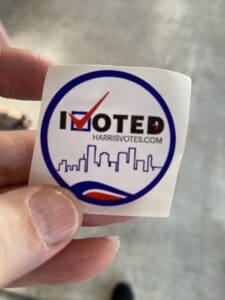
Yes, I said a CHRISTIAN’S responsibility. In truth, it’s every American’s civic responsibility; I merely specify Christians here because there are so many that have the idea we’re supposed to stay out of politics. Nothing could be further from the truth.
You can toss around the phrase “separation of church and state” if you like, but you’ll be using it out of context. No, it’s not in the constitution no matter how many people believe it is. The phrase appears one time, in a letter from Thomas Jefferson to the Danbury Baptist Association in which he assured them that there was a wall protecting the Church from the government – not the other way around. Doubt me? It would take maybe ten seconds to do a search and find the text.
I was going to pull in a quote here, one that is commonly attributed to Edmund Burke. In double checking the actual quote and attribution I went down a fascinating rabbit hole that ended with, “We honestly don’t know who said it.” In the meantime, I found this, which was printed in a 1895 medical bulletin, and it even more clearly says what I want to get across.
“He should not be lulled to repose by the delusion that he does no harm who takes no part in public affairs. He should know that bad men need no better opportunity than when good men look on and do nothing. He should stand to his principles even if leaders go wrong.”
BOOM!
My convictions about voting go way back to a childhood conversation. David Marion Tisdale, my grandfather and, in my opinion, one of the best men who ever lived, once told me that if a man doesn’t vote he has no right to complain about the government. Apparently, if someone started complaining to him about government related issues, his immediate question would be, “Did you vote in the election?” If the answer was “No,” the conversation was over.
Obviously, I hold certain convictions that affect the votes I cast, and I would love it if everyone voted the way I do. Here’s the deal, though. The bottom line is that I firmly believe everyone should get out and vote, period. And every Christian should get out and vote as God leads them to. If we don’t, we’re shirking our responsibility, and if we stand by and do nothing it’s our own fault when the government becomes something other than what we believe it should be.
Which, as I understand it, is exactly why many of the Amish are suddenly voting en masse. If you’re not aware, this is a history-making event. A government agency encroached on their community not long ago and many of them realized that they can no longer stand completely apart. They are choosing not to be those “good men” who “look on and do nothing.”
Do your research. Spend time in prayer over how God would have you vote – on everything, not just for President of the United States. Then get out there and take action.
There are many reasons ours is a “free country” and the power of the individual’s vote is one of them.
Celebrating Jesus!
Tammy C
